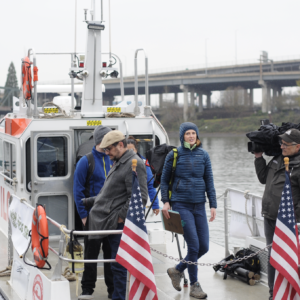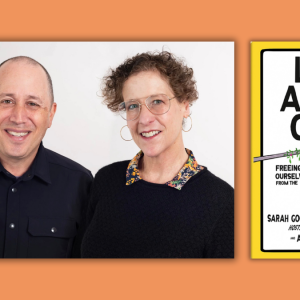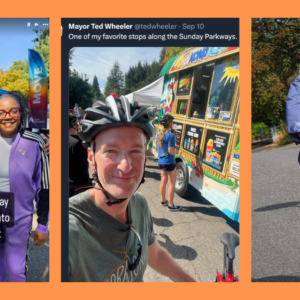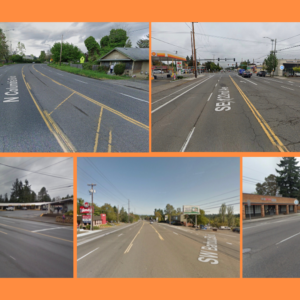
Roskowski during a Netherlands study tour in June.
(Photo © J. Maus/BikePortland)
Portland will host bicycle planning leaders from six U.S. cities at a reception tonight to mark the end of the first phase of the ‘Green Lane Project.’ Portland was one of six cities accepted into the program back in April 2012 (the others were Austin, Chicago, Memphis, San Francisco, and Washington, D.C.) Funded by the industry-backed non-profit Bikes Belong, the goal of the Green Lane Project is to hasten the development of protected bikeways in America.
The leader of the project, Martha Roskowski, says the project has been a big success. “[The Green Lane Project] helped to normalize protected bike lanes not just in these six cities; but also nationally. We created a dialogue around protected lanes and a desire for more of them and we have set a standard for what a bike lane should/could look like.”
In addition to raising awareness for protected bike lanes through the media, their blog, and other channels, the Green Lane Project led domestic and international study tours. City staffers, politicians, and other key decision makers joined these tours to see the vision of what a great bike city looks like. Roskowski also said the application process (to become a Green Lane Project city) itself was powerful. “It put the conversation on the table and got city leadership to focus and talk about protected bikeways.”
According to an inventory of protected bikeways completed back in December, the Green Lane Project estimates that the total number of them doubled in 2012 and is on pace to double again by the end of this year. (Interestingly, Portland hasn’t added any new protected bike lanes since joining the program.)
What’s the magic ingredient for cities looking to build more protected bikeways? Roskowski shared a familiar answer: political support. “That’s the best indicator of success,” she says. “Every city is different in terms of their mix, but the political support piece is the front-line that we look at. Take Chicago for instance, they’ve made amazing progress and [Mayor] Rahm Emanuel was responsible for a lot of that because he came in with a bold vision.”
At tonight’s event, leaders from each of the six cities will recap what they’ve done, share lessons learned, and discuss what comes next. Speakers will include Portland’s Transportation Commissioner Steve Novick, Metro Councilor Sam Chase, and the Deputy Commissioner of Chicago’s DOT, Scott Kubly.
Roskowski says Portland and the other five original Green Lane Project cities will now “transition into senior cities.” The application process for the next batch of cities will open next month and Bikes Belong will announce the new cities in spring 2014.







Thanks for reading.
BikePortland has served this community with independent community journalism since 2005. We rely on subscriptions from readers like you to survive. Your financial support is vital in keeping this valuable resource alive and well.
Please subscribe today to strengthen and expand our work.
Hi Jonathan – Multnomah appears to have gone in after April 2012, and “protected bike lanes” is in your headline. 🙂
http://bikeportland.org/2012/11/09/first-look-new-protected-bike-lanes-on-ne-multnomah-street-79880
Hi Elliot,
The ink was dry on the plans for NE Multnomah before Portland was a part of this program. In other words, the protected lanes on Multnomah had absolutely nothing to do with the Green Lane Project. My only point in bringing attention to this is to show that — even with help from this project — Portland continues to lag behind when it comes to creating protected bikeways.
I see where you’re coming from, and I’m with you that planning and building protected lanes are different things. But the way you’ve written the story introduces the idea of protected lanes doubling everywhere except Portland. Actually, the Green Lane protected bikeway inventory you refer to counted Multnomah as being added in 2012, and they counted it towards the national doubling you reference:
http://docs.google.com/spreadsheet/ccc?key=0Aq-SAP-8fp4wdF9MdXByY2xUYjdEZWIyaGQ2NV9LUHc
Personally, I didn’t hear about the Multnomah project until after it went in. I presume PBOT has several other planned protected bikeways in the pipeline that haven’t been installed yet (emphasis on presume). Unless you’ve confirmed that PBOT has suspended planning protected bike lanes since April 2012, it looks a bit like you’re trying to have it both ways. If you don’t want to count previously planned projects that were installed last year (Multnomah), shouldn’t current planning projects that haven’t been installed yet be fair game for your tally?
I agree I wish we were adding buffered bike lanes and cycle tracks a lot faster, it just doesn’t seem fair to PBOT to not credit them for their work.
Thanks for making your point Elliot.
I’m not trying to withhold credit from PBOT. I’m just trying to point out that I feel it’s notable and interesting that Portland’s involvement with the Green Lane Project didn’t seem to result in any added urgency or momentum to build protected lanes. That is all. We did benefit from the project no doubt… in terms of the Netherlands Study Tour we went on and the general information-sharing and so on.
I agree with your main point, Jonathan. This part…
“We did benefit from the project no doubt… in terms of the Netherlands Study Tour we went on and the general information-sharing and so on.”
…while true enough on its own misses out on the elegantly simple point by spare_wheel the other day “I believe that if we plastered this city with 8-10 foot wide buffered bike lanes our mode share would skyrocket.”
In other words, the payback on those investments in education and information sharing needs to be many new lane-miles on the ground for bikes to actually use*, not just good intentions. To repurpose Roskowski’s slightly misplaced words, THAT is the best indicator of success.
(*along with enforcing laws protecting bikes and peds, culture and education changes, etc.)
I couldn’t agree with you and spare_wheel more. I am tired of networking and information -sharing! It’s long overdue that we simply start putting stuff on the ground! We have really stalled out and I think we’ve had waaay too much talk and far too little action in the past few years.
This is really embarrassing — for everybody involved with Portland’s bike infrastructure — that we continue to reap the good feelings from being considered “America’s bike city” while not in fact making any progress. Sooner orr later, we’re going to be called out on this, and all that smugness can just get wiped off our collective faces.
Is the event open to the public? When and where?
?
says here
http://bikeportland.org/2012/05/31/press-release-portland-joins-five-other-cities-in-national-project-for-protected-bikeways-72632
multnomah was part of portland’s application to be included in the project. also williams and the sellwood and light rail bridges.
So we are got protected bike lanes on Multnomah, which were already planned, and will get them on Williams – also already in the plans. Yet now Portland gets to rest on our laurels as we and the other 5 “transition into senior cities” without planning any new projects.
For shame.
Downtown is ripe for new bikeways on 3rd, 4th, 12th, 13th, and Broadway, in addition to a number of east-west streets. It needs to happen, and right now our politicians don’t have the backbone to do what is right.
Don’t forget the South Park Blocks, too!
If Broadway remains Southbound only for bikes, the northbound route along SW and NW Park could be designed like a bike boulevard, so I didn’t include that one.
It would be nice if some of the N-S streets had 2-way bikeways, like Vancouver BC has. That way you don’t have to ‘go around the block’ to go back home, and the issues with alternate wayfinding/consulting google maps for 5/10 minutes that sometimes is a part of that.
Oh! I was almost outraged that Portland was going to again jump in importance, then realized that they probably mean that we are now going to “transition in to a senior” city because we’ laid the groundwork a long time ago, took our early retirement, and are now falling asleep in the rocking chair after Perry Mason reruns air.
Maybe we could transisiton to “Senior status” if we had a network of protected bike lanes. Parking right now is still more important it seems. Until this attitude changes….